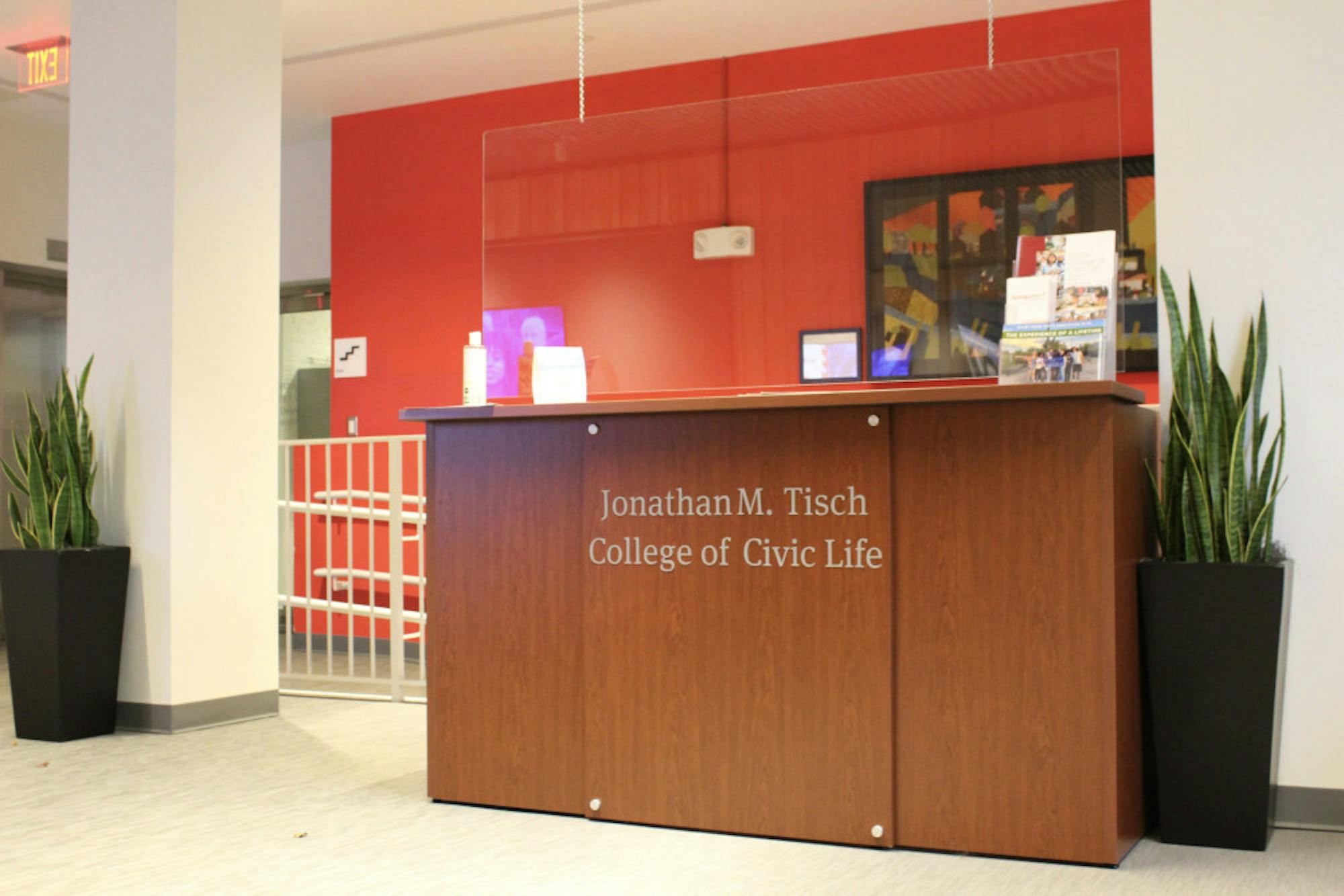Editor’s note: Marianna Schantz is an editorialist at the Tufts Daily. Schantz was not involved in the reporting, writing or editing of this article.
Tufts Alliance Linking Leaders in Education and the Services presented their ninth annual Civil-Military Relations conference on Nov. 11 and 12 in Cabot Hall at The Fletcher School. The conference theme was “Geopolitics, Resources, and Power Projection” and featured a series of expert panels and breakout sessions. Midshipmen and cadets from the United States Naval Academy and the United States Military Academy West Point attended the conference, along with members of the Tufts community.
The event was hosted in person for the first time since 2019. ALLIES co-directors Jackson Lubke and Nitya Nadgir were excited to have the conference back in person and praised the efforts of conference director Marianna Schantz.
“Marianna did a lot of research on speakers for the conference — she looked into people working in academia, the government, or think tanks who had research experience related to resource extraction and its role in geopolitics,” Nadgir wrote in an email to the Daily.
The conference’s ultimate goal was to bring together future leaders in both military and civilian spaces.
“By bringing students from the military academies to Tufts to talk about resources in geopolitics, [Schantz] hoped to expose future military leaders to civilian ideas, so they can one day take into account civilian perspectives when making decisions,” Nadgir wrote. “Meanwhile, [Schantz] wanted the conference to expose Tufts students to how people in the US military approach policy to better equip them to represent civilians in leadership positions.”
Tisch College and the Institute for Global Leadership provided additional logistic support for the conference. Tisch College Associate Dean for Programs and Administration Diane Ryan presented opening remarks during the Veteran’s Day ceremony. Ryan drew on her nearly 30 years of experience in uniformed service, including 10 years as an instructor at West Point, in addition to her civilian role at Tufts, as she welcomed attendees to the conference.
Keynote speaker Dr. Yong Deng joined via Zoom to present a talk titled “Geopolitics and Geoeconomics of the China Challenge.” Deng is a professor of political science at the United States Naval Academy with deep knowledge of China and the Asia-Pacific Region, having published five books focusing on China and Chinese foreign policy. Deng drew on this knowledge to explain the role of geoeconomics in Chinese foreign policy and in China’s rise to greater international power in the 21st century.
The conference consisted of several panels of experts. On Nov. 11, the first panel was presented with the theme of “Resource Extraction in China’s Power Projection.” The panel sought to examine China’s use of geopolitics and resource extraction in power projection across the world.
Panel speakers included Lieutenant Justin Chock, Matthew Geraci and Dexter Tiff Roberts. Chock is a senior instructor in the political science department at the United States Naval Academy and conducts research focusing on Asia-Pacific security, especially Chinese foreign policy and the U.S.-Japan alliance. Geraci has extensive research experience focusing on China and currently serves as assistant director of the Atlantic Council’s Global China Hub; Roberts is also involved with the Atlantic Council as a senior fellow as well as a fellow at the Maureen and Mike Mansfield Center.
All panel discussions were followed by breakout sessions where attendees could choose to spend more time learning from a given expert.
West Point cadet second-class Kyle Sweeten found this format to be engaging.
“The panel put together for the Tufts conference was top notch,” Sweeten wrote in an email to the Daily, noting that his comments do not reflect views of the United States Military Academy or Army as a whole. “I enjoyed all of the opinions presented and would like to have engaged more with the speakers.”
The second day of the conference brought two more panels with breakout sessions as well as a lunch where conference participants were able to interact. The second panel, “Geopolitical Competition in the Arctic,” focused on the strategic importance of the Arctic and the impacts of climate change in the region. Panelists included Dr. Nong Hong, Marisol Maddox and The Fletcher School’s own Rockford “Rocky” Weitz.
Lubke was particularly looking forward to this panel.
“I was personally very excited for the panel on the Arctic, which did not disappoint,” Lubke wrote. “It was very valuable to learn about the intersection between climate change and international relations, and how global warming may cause international instability and discord due to the polar ice caps melting.”
Nadgir also learned a lot from the panel and was excited about the breakout room sessions.
“The panelists mentioned how temperatures in the arctic are rising at a rate 3x the global average and ocean acidification is rapidly affecting the Arctic climate, which is extremely concerning,” Nadgir wrote. “I was also looking forward to hearing from Dr. Rocky Weitz in his breakout room about his Tisch Faculty Fellow Project on engaging Arctic indigenous youth in the conversation surrounding geopolitics and climate change in the region.”
The third and final panel, “Violence in State Expansion: Ukraine,” focused on Russia’s use of terror and violence in the invasion of Ukraine. The three panelists were Arik Burakovsky, Robert Person and Benjamin L. Schmitt.
Sweeten found this panel to be the most memorable.
“The panel I most remember was discussing the popularity of the war in Ukraine,” he wrote. “I find the conflicting stories of the Russian people both abhorring and supporting the war to be intriguing.”
Sweeten’s biggest takeaway from the conference was an appreciation for this open dialogue between civilian students and service academy students.
“I enjoy these conferences because of the opportunity to speak with civilian students,” he wrote. “It is refreshing to speak with students that do not possess that [military] framework. They produce refreshing solutions and evaluate situations with different ideas in mind than are popular at West Point.”






